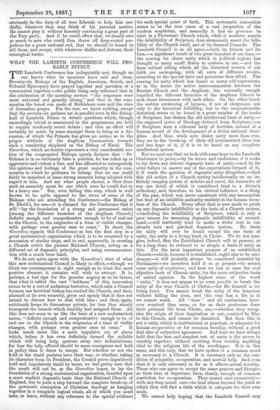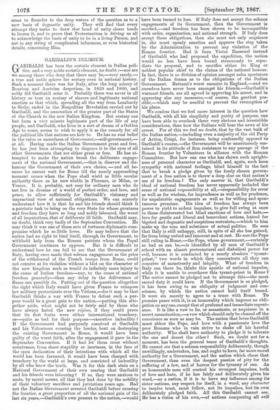WHAT THE LAMBETH CONFERENCE WILL PRO- BABLY EFFECT.
THE Lambeth Conference has indisputably met, though no one knows what its members have said and done. Seventy-six Bishops of the English, American, Scotch, and Colonial Episcopacy have prayed together and partaken of a communion together, —the public being only informed that in the celebration of the morning service "the responses were most universal and grandly strong," and that in the com- munion the bread was made of Bethlehem corn and the wine of Jerusalem grapes. For the rest, we know nothing, except that the seventy-six prelates sat in parallel rows in the dining- hall of Lambeth Palace to debate questions which, though exceedingly trivial as announced in the programme, are held to require studiously secret debate ; and that an effort will certainly be made by some amongst them to bring on a dis- cussion, of which the Primate has given no notice, as to the proper attitude of the Anglican Communion towards such a wandering shepherd as the Bishop of Natal. The Guardian, which no doubts represents a very considerable sec- tion of the congregated Bishops, openly declares that "Dr. Colenso is in so extremely false a position, he has taken up so aggressive and violent a line, and has affronted so outrageously the opinions and feelings of the great majority in the com- munion to which he professes to belong, that no one could fairly be surprised at some strong measure being adopted with _regard to him. And say what people choose, a blow from such an assembly must be one which even he would feel to be a heavy one." But, even failing this step, which is well known to be quite opposed to the views of some of the Bishops who are attending the Conference—the Bishop of St. David's, for one—it is claimed for the Conference that it will "lay the foundation of a strong and permanent union {among the different branches of the Anglican Church] definite enough and comprehensive enough to be of real use to the Church, in the exigencies of a time of visible changes, with perhaps even greater ones to come." In short, the Guardian regards this Conference as but the first step in a great ecclesiastical organization which is to be cemented by a succession of similar steps, and to end, apparently, in creating a Church within the present National Church, acting on a different set of dogmatic principles, and using excommunica- tion with a much freer hand.
We do not quite agree with the Guardian's view of what this new ecclesiastical Council is likely to effect,—though we think our contemporary is right enough as to what the most positive element it contains will wish to attempt. It is, perhaps, a bad sign for the grander augury as to its future, that what is called the vast " boldness " of this innovation zeems to be a sort of audacious hesitation, which calls a Council because one heretical bishop has excited the Church, and then, alarmed at its own temerity, gives out openly that it does not intend to discuss how to deal with him ; and then, again, sedulously keeps its discussions private, for fear they should transgress the bounds which timidity had assigned them. All this does not seem to us like the basis of a new ecclesiastical union, "definite enough and comprehensive enough to be of real use to the Church in the exigencies of a time of visible changes, with. perhaps even greater ones to come." It looks much more like a mere impulsive cry of alarm which, before it has even definitely formed the syllable which will bring help, quavers away into indistinctness, for fear the help offered should be more courageous and bold in policy than it dares to accept. But whether or not the bold or the timid prelates have their way, or whether, taking its character from its President, the Council prove impulsively bold and impulsively timid by turns, we feel pretty sure that the result will not be, as the Guardian hopes, to lay the foundation of a strong ecclesiastical organization, founded upon a more explicit dogmatic basis than the National Church of England, but to push a step forward the complete break-up of the systematic conception of Christian theology as hanging together in a complete logical whole, all of which you must take, or leave, without any reference to the special evidence for each special point of faith. This systematic conception. seems to us the true cause of a vast proportion of the modern scepticism, and assuredly it has no pretence to exist in a Protestant Church which, while it nowhere asserts the infallilaility of Scripture, does strenuously assert the falli- bility of the Church itself, and of its General Councils. The Lambeth Council is, as all agree,—both its friends and its foes,—a significant result of two great impulses of our time,— the craving for closer unity which in political regions has brought so many small States to coalesce in one, —and the keen critical sifting which all the historical sources of our faith are undergoing, with all sorts of different results, according to the special facts and premisses thus sifted. The craving for unity which has found, so many odd expressions, as in the desire for active intercommunion between the Russian Church and the Anglican, has naturally enough impelled the different branches of the Anglican Church to seek closer intercourse with each other, On the other hand, the sudden awakening of laymen, if not of clergymen, not only to the historical fallibility, but to the unquestionable historical errors to be found in a great number of the books of Scripture, has shaken the old intellectual basis of unity,— the supposed system of theology deduced from Scripture,—as if Scripture were a coherent body of doctrine, instead of a human record of the development of a divine national disci- pline. And thus, while men desire unity more than ever, they see in the break-up of their old systematized ideas less and less hope of it, if it is to be based on any complete intellectual system.
But we must say that we look with some hope to the Lambeth Conference to prove,—by its errors and confusions, if it seeks to lay down any stricter dogmatic basis of unity,—and by its utter failure to answer any of the expectations formed of it, it if evade the question of dogmatic unity altogether, —that this old notion of a Church resting intellectually on an in- finitely complex system of articles and creed, the surrender of any one detail of which is considered fatal to a divine's orthodoxy, and, therefore, to his clerical influence, is a thing of the past, which was never consistent with any assumption but that of an infallible authority resident in the human mem- bers of the Church. Every effort that is now made to patch up any dogmatic infallibility as the basis of a Church system, —including the infallibility of Scripture, which is only a poor excuse for assuming dogmatic infallibility at second.- hand,—will inevitably tend to make a wider rent in our already torn and patched dogmatic system. No basis for unity will ever be found except the one basis of unity, the unity in a living head, in Christ. We do not ima- gine, indeed, that the Established Church will at present, or for a long time, be reduced to so simple a basis of unity as this. For the most important purpose of an established. Church—which, because it is established, ought also to be mis- sionary—it will probably always be considered essential by' Parliament—we ourselves hold it so at present—to secure some unity of confession; and here we lose at once the real objective basis of Church unity, for the more subjective basis of united opinion. In the highest sense of the word "unity," it does not appear to us even possible to break the unity of the true Church of Christ,—for He himself is its living bond. You cannot break the unity of the branches without killing the stem, and this vine has a life in it we cannot reach. All " isms " and all confessions, how- ever sceptical they seem, so far as their professors draw their personal life from Christ, are,—whether they recog- nize the origin of their inspiration or not,—united by Him in this Church, and cannot be disunited. But then this is not a unity which is institutional or practical, or adequate for human co-operation or for common worship, without a good. deal also of subjective agreement. And here we have always held that the best and simplest test of unity is the power to worship together, without omitting from worship anything vital to the religious life of the worshipper. It is in this sense, and this only, that we have spoken of a common creed_ as necessary to a Church. It is necessary only as the con- dition of sympathy, co-operation, and mutual help. And. even then it is only necessary so far as it affects actual worship. Those who can agree to accept the same prayers and liturgies as their base of departure, have, clearly, enough of common conviction for co-operation. They cannot care excessively— with any deep moral care—to lead. others beyond the point at which they will find a faith which is adequate for their own. souls.
We cannot help hoping that the Lambeth Council may dome to flounder in the deep waters of the question as to a new basis of dogmatic unity. They will find that every attempt they make to draw that bond of unity closer tends to loosen it, and to prove that Protestantism is driving us all to acknowledge the basis of unity to be in a living Person, and not in any string of complicated inferences, or even historical details, concerning Him.































 Previous page
Previous page